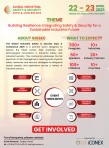- Saraswati World School Sparks Spirit and Sportsmanship at Annual Sports Meet
- Neeraj Malik, Chief Business Officer at Aptech, recognised with the coveted Atal Samman Samaroh Honors
- Raffles Jaipur ushers in the Festive Season with a Magical Christmas Tree Lighting Ceremony
- Oyecommerz Launches Seamless Magento to Shopify Migration Service
- AAFT School of Hospitality and Tourism Celebrates Panamanian Cuisine at the 17th GFFN
- Newsletter ‘Cine Fiesta’ Released During the 17th Global Film Festival Noida
- Bharatmuni Rang Utsav concludes with a spectacular final day
- Gem and Jewellery Export Promotion Council Presents Pre-Budget Recommendations to Hon'ble Finance Minister
- Vishva Hindu Parishad announces nationwide public awakening campaign for liberation of temples from government control
- The AVTODOM Group team introduced partners to the advantages of the OMODA and JAECOO brands
- GT Scaffolding (Contractors) Ltd Expands Premier Scaffolding Services Across Surrey and Hampshire
- Tanishq Diamonds New Campaign Honours the Modern Woman’s Brilliance and Sparkle
- Innovative RMail Features for Lawyers Highlighted at The Florida Bar’s LegalFuel CLE Session
- Honda Motorcycle & Scooter India launches New 2025 Unicorn ‘Be A Wing Rider’
- CFlo World Limited Completes Restructuring to Pursue Public Market Listing in India
 Mail to a Friend Mail to a Friend |
|
     |
Low-calorie Food Market fueling High Prevalence of Obesity in Developed Nations

According to the WHO, 1.5 mn deaths are directly associated with diabetes each year. WHO statistics from 2014 also show that 13% of adults around the world were suffering from obesity and 39% of adults were found to be overweight. Wrong food habits and high calorie intake are the prime reasons why an increasing number of people across the globe suffer from ailments such as diabetes and obesity. Thanks to the availability of low-calorie food, there is still hope for preventing obesity. Low-calorie food uses artificial sweeteners in place of sugar, thus developing the same amount of sweetness, but without the use of sugar. The increasing awareness among people about health issues and the rising incidence of diabetes and obesity have together shaped the global low-calorie food market.
Browse the full Press Release:http://www.transparencymarketresearch.com/pressrelease/zero-calorie-low-calorie-food-market.htm
Transparency Market Research (TMR), a leading business intelligence firm, in its recent report, mentions that the global market for low-calorie food is set to expand at a CAGR of 5.9% for the period from 2014 to 2019, reaching a total market value of US$10.4?bn by 2019. The modern-day lifestyle, in which junk food is being consumed more than ever, has given rise to the high incidence of obesity, which consequently often leads to diabetes, propelling the demand for low-calorie food. Consumers are increasingly beginning to view low-calorie food as a feasible way to combat and even prevent obesity and diabetes, thus fueling the low-calorie food market.
High Prevalence of Obesity in Developed Nations Boosts the Market for Low-calorie Food
Obesity is rampant in developed nations such as the U.K., the U.S., and Australia, where 20% of the population suffers from obesity. The increase in the disposable income among the people in developed nations allows them to conveniently stock up a wide variety of low-calorie food, thus stimulating the market for low-calorie food.
Growing Interest from Industry Participants Drives Low-calorie Food Market
Consumers have, in recent years, become increasingly health-conscious and more aware about the consequences of having sugary food and beverages. An increasing number of consumers prefer and demand low-calorie salad dressings, dairy products, low-calorie beverages, and sugar-free chewing gum. This demand from the consumers has compelled the participants of the food and beverages industry to make healthier food, driving the market for low-calorie food.
Request a Brochure of this Report :http://www.transparencymarketresearch.com/sample/sample.php?flag=S&rep_id=1871
Evidence of Artificial Sweeteners Being Unsafe Restrains Low-calorie Food Market
Contrary to the popular belief that low-calorie foods and beverages help lose weight and prevent diabetes, an increasing amount of evidence shows that artificial sweeteners such as aspartame can cause weight gain, affect the blood glucose level, and even interfere with insulin response. The growing evidence of artificial sweeteners being unsafe is a major challenge faced by the low-calorie food market.
Another factor that can restrain the market for low-calorie food is the high price of low-calorie food. This is especially true for APAC and RoW, making it difficult for market players to expand their operations in these regions.
Company :-Transparency market Research
User :- Amy James
Email :-pradnya@transparencymarketresearch.com
Phone :-15186-518-6181030
Mobile:- 518-6181030
Url :- http://www.transparencymarketresearch.com/zero-calorie-low-calorie-food.html











